One of the things I love about living in Champaign-Urbana is the plethora of international artists and authors that come through. In the relatively brief time I’ve lived here, I’ve enjoyed Ravi Shankar, Susan Sontag, Yo Yo Ma, Ralph Nader, David Sedaris, … then there’s Ebertfest, … if I started listing rock bands this list would become unmanageable. I recently saw both Emmylou Harris and Mandy Patinkin. This week I’ll be seeing Joshua Bell. C-U, for its size, is simply wonderful in this regard. It’s one of the reasons I moved here and it’s one of the reasons I’ve stayed.
But what I didn’t know until after I moved here is that in C-U, we also have our own artists, our own authors, our own intellectuals. And C-U is a city that cultivates and supports our own. One of these is Laurent Gasquet. I’ve known Laurent for years; he works at Sun Singer Wine & Spirits, and I visit there at least three times a month. Laurent is one of the reasons that Sun Singer is a practically perfect place to dine. His encyclopedic knowledge of wines is remarkable, and having him pair a red or white with your meal will never result in disappointment.
But a few weeks ago, while talking with him during a wine tasting, I learned that Laurent is also a photographer, and a darn good one. I immediately thought, “oenophile, photographer, … Frenchman. Triple threat. I must interview him for SP.”
Thus, dear readers, I present to you, Laurent Gasquet: Renaissance man.
~~*~~
Anything may happen in France~~François de la Rochefoucauld
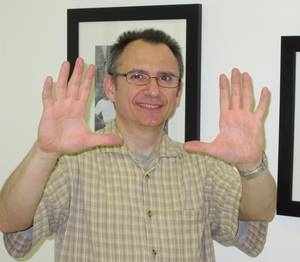 Smile Politely: Where in France are you from?
Smile Politely: Where in France are you from?
Laurent Gasquet: I am from Marseille, which is on the coast of the Mediterranean Sea between the Rhone River and the Riviera. Nobody goes there anymore because it has a bad reputation. In the movie The French Connection, you have a depiction of the old Marseille, which was destroyed in 1940, and it’s true that it was a drug-trafficked and drug-infested city, but now it’s different. It’s more … they do it in a more suave and discreet way.
SP: Was Marseille a violent and dangerous place for a kid to grow up?
Gasquet: Not in my area. It was a little bit rough. It’s still rough. There is in Marseille a specific area where the police do not go.
SP: Why did you move to the states? And how long have you lived here?
Gasquet: I moved to the states in 1992 or ’93. I met my ex-wife in March 1991. It was during my study of photography in Paris. We met on the steps of the Opera.
SP: Were you attending the opera there?
Gasquet: No, I was coming out of the Opera taking pictures of the ballerinas. That’s how it started: the ballerinas. At that time I liked ballet pictures.
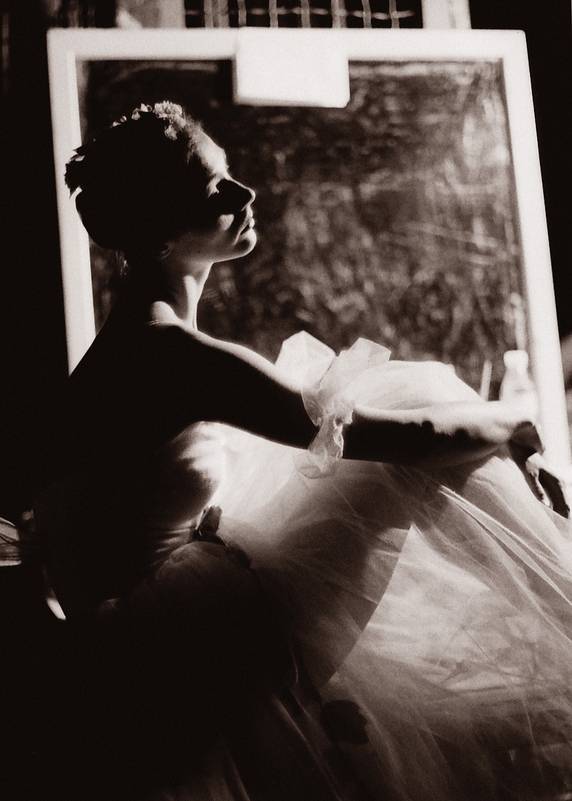
Ballerina of the Kirov Ballet at the Palais Garnier in Paris
It was the last night of her trip in Paris, and her best friend suggested that they go to the Opera. Imagine all of the tourists there, all taking pictures of each other in front of the building. I happened to be taking my self-portrait to finish my film — at that time, people used film — and they approached me. They thought, “two against one; he’s a little, skinny French guy; we can beat him.” So that’s how we met.
SP: And she’s from Champaign?
Gasquet: She’s from Champaign, yes. And the nice story ends badly, like in a good French movie. We got divorced about seven years ago. I was working for many years during our marriage in a professional photo lab, Film Processing Limited. And because of her, I found a job at Sun Singer.
SP: Why did you end your job at Film Processing Limited?
Gasquet: The lab closed down because of technology changes. People use less and less film. Before that, we’d moved from 309 S. Neil into a large building downtown. It was expensive, and at the same time, the industry collapsed. So we couldn’t stay there and I got laid off two years after the move.
SP: Do you think you’ll ever return to France permanently?
 Gasquet: When I start something I like to finish it. And life in France is not always what people think. People think it’s easy in France to live, the food is good, people are wonderful, women are wearing pretty dresses. On the other hand, you have unemployment. I would have to start everything all over at zero. I would probably be on unemployment for a while. I have a very nice degree in photography, but I have no technique or formation in any field. And I would have the same problems over there that I have here.
Gasquet: When I start something I like to finish it. And life in France is not always what people think. People think it’s easy in France to live, the food is good, people are wonderful, women are wearing pretty dresses. On the other hand, you have unemployment. I would have to start everything all over at zero. I would probably be on unemployment for a while. I have a very nice degree in photography, but I have no technique or formation in any field. And I would have the same problems over there that I have here.
Now the big difference, the huge difference, is that a lot of my family are over there. I love them to death, but it would be so complicated that I’d rather try to be different here — because I think I’m different here — than I would be over there. Over there I would be just another photographer, but here I’m the French guy who loves living in the middle of the cornfield, and that’s why I think I stand out, and I’m trying to work on that.
Now, I wish I could be more successful, rich and famous, going back to France every year or every six months, but it’s not that simple. Going back and making it all over again, it’s not that simple. Here, I stand out and that’s a big thing. And also, the community here is amazing. The people are very nice. I like big cities, but here is a little bit like a big city, but at the small scale. You have arts, entertainment, you have the U of I. People don’t know how lucky they are.
SP: I know.
Gasquet: They don’t, they don’t, they don’t. It’s amazing here.
~~*~~
Wine is the most civilized thing in the world~~Ernest Hemingway
SP: So you began working at Sun Singer after your job at the photo lab ended?
Gasquet: That’s correct.
SP: How did you become so well-versed in wines?
Gasquet: It’s a cultural thing. The funny thing is that my dad is not really into wine like I am, but a lot of my relatives do like a lot of wine. And we are all fairly well in the family, very healthy, eating lots of veggies and everything. And I happened to notice that the pairing of food is important. And I noticed that some of my relatives who were gourmet would have, sometimes, outstanding food with outstanding wine, and trying one thing or changing the order wouldn’t work. And they would have sometimes … they would pull out of the cellar wines from the 1915s or 1916s, and I would think, “Why do they make such a big fuss out of it?” And that’s how I became educated: by reading, by trying, by cooking a little bit. I’m not a great cook, but I think I can make a decent meal. Personally, I think being a great cook is being able to feed a family of four every day, and being interesting and not boring. That’s what a great cook is for me. Now being a gourmet chef is different; I’m not a gourmet chef.
Traveling was so interesting because wine is all about location. When you go to see a winery where they make very deep, intense, dark, red wine, and you see one where they make a rosé, they have different types of soil, different types of containers to age the wine, to ferment it … all of that matters.
So I became educated in wine by reading, studying, traveling, and doing a little bit of cooking. And my relatives really taught me a lot of things. A lot of things.
SP: My spouse and I love to attend your wine tastings at Sun Singer. All of the men that work there and do the tastings are great, but you especially are. All of that education you talked about is reflected in the wines that you select.
Gasquet: Thank you.
SP: What is your selection process for your tastings?
Gasquet: The wine tastings are all about timing, like photography. When I open a bottle of wine at noon, it’s pretty much not boring, not flat, but it doesn’t show its full potential. By 2:30–3:00, that’s when it shows its full potential. I tell people who show up at noon to return, if they can, at 1:00, 2:00, or 3:00, and they will see whether the wine is standing up, or holding up, to its reputation. And that’s the fun part about it.
People sometimes ask me why I don’t open the wine at 10 a.m. and wait until noon and change the wine. Well, because one thing about wine that’s like life, or like taking a picture, is that you can’t always have a good wine. You won’t have a bad one because a bad wine is technically corked, meaning the cork pokes down and influences the taste of the wine, so it will taste and smell like water pretty much. But you can have good wine and satisfying wine and outstanding wine. So around 2:00, the wine’s had time to breathe and that’s when it’s showing its full potential.
So, that’s why I tell people to come back if they can, and they’ll see the wine will be different.
SP: So it’s important to taste it at noon, and then taste it again a few hours later…
Gasquet: Yes, it’s important to take the time to drink the wine. And that’s a French thing — taking your time to eat, taking the time to drink the wine, and it is also very important to eat well, and everything goes together. So, you can have a fairly decent, big meal, but if you take your time, your body can process it and you won’t get sick from it.
SP: What do you think about our local wineries in Illinois?
Gasquet: They make the best wine they can make from what they have. They can’t make better wine because of the soil, because of the weather. They will never make an intense Cabernet; they will never make a Riesling like in Germany because of the soil, because of the weather, and the location. It’s impossible. But with what they have, they do a very good job.
SP: So if we approach their wines not expecting a robust red…
Gasquet: It’s impossible.
SP: …we might enjoy them more.
Gasquet: Absolutely. Why aren’t the French making wine like in California? Because they are not there. And why doesn’t California make Riesling like in Germany? Because they are not there. That’s all there is to it.
~~*~~
There are no rules for good photographs; there are only good photographs~~Ansel Adams
SP: Do you consider yourself a wine connoisseur whose hobby is photography, or do you consider yourself a photographer who happens to sell wine?
Gasquet: Number two. Because I think photography is really in my soul, in my guts. Everywhere I look, I think, “That would be a nice picture. Look at the color on this. Look at the dress on that woman. Look at the color of the tree.” I’m very sensitive to color, to smell, to my surroundings.

It’s very important, and has to do with wine a little bit, because — as I said before — it’s all about time also. The difference with time is that photography is always in the moment; it’s an instant, a very short instant. But wine is like a long exposure. You want to take your time to drink a glass of wine, and you want to get what is a right moment, a very, very short instant to take a nice picture.
SP: Have you been taking pictures all of your life? Has this been a life-long love?
Gasquet: Yes, my grandfather gave me the bug by taking pictures during a festival of wine at Touchay. He was in the Artillery and I have a picture of him and his friends with guns in the mud. It was flat and muddy, but it was uneven; it wasn’t nice; it was chaos. And I was thinking, “Jesus, there is nothing to see.” But people have to know what it was.

Sunsets in Illinois
So, when I was a teenager, instead of going out chasing girls, I would close our bathroom at home and make a darkroom out of it, putting a bulb above the tub, and work with my chemicals, processing films, prints, and all that stuff.
SP: Your parents must have been very indulgent.
Gasquet: For that, they were indulgent, because I was a nice kid; I wasn’t creating trouble and I wasn’t bothering anybody. It’s a safe hobby.
In Marseille, I would go out at night and take pictures of the buildings because at the time I would use a flashlight and do some light painting over a long exposure of the buildings. The city opened some gates at night to some buildings so I could do that.
SP: What do you consider your specialization to be? What subject matter do you focus on for your photography?
Gasquet: People, people, people.
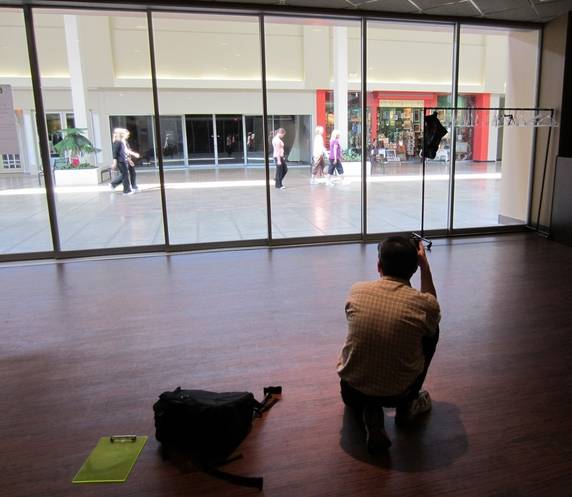
People are amazing, strange, and unpredictable. Like last night at the store, people were — at the same time — arrogant, crazy, very nice, a whole panoply or shade of different tempers and attitudes and landscapes. With people, there is always something to take a picture of. Always. There aren’t two people the same, even with trends, even with fashions there are no two people the same. The variety of subject, the variety of aspiration is insane. It’s endless.
I would say, “woman” also, but that would be falling into the cliché of the French guy who takes pictures of women [laughs] … Women here are different.
SP: What do you mean?
Gasquet: They dress funny [laughs], and I probably need to move to a bigger city because I like style and fashion and that’s lacking here. I don’t mean “snobbism,” wearing only expensive things; that’s different. I’m talking about having a sense of style. Americans are very practical in their dress, and there is nothing wrong with that. Why would they wear fashion designer or nice clothes if they work behind a desk? They have to be comfortable. Why would they be wearing pretty, but painful shoes; why would they make an effort when it’s not necessary? That’s the American set of mind.
In France, they would be probably better dressed; they would not be wearing tennis shoes. The thing that struck me when I first went to New York was seeing a secretary in tennis shoes. I never understood that. And after working awhile, I realized, “Hey, they are smart. It makes sense. They’re only visible from the waist up; they are behind a desk.” Why wear high heeled shoes, or whatever, if nobody sees. Why?
So French women say, “It makes me feel prettier.” American women are saying, “Because it’s more practical and makes more sense.” Well you can think and argue about that forever, but I have to say that sometimes, I prefer “prettier” to “practical.” [laughs].
SP: [Laughs] So those are the “different attitudes” that you look for when you’re taking photographs?
Gasquet: I haven’t been in France for a while. When I was there, I liked to take pictures of goofy French things that were — at the time — normal for me. And I’m forgetting now, what I think is goofy in the American population. And I don’t consider myself American, I’m still French; but I’m very American also. I’m voting; I’m fairly involved, and I’m trying to keep up with politics; I think they are awful.
So, the shift here in attitude as far as taking pictures, I’m forgetting what I found interesting here. And that’s, this change of mine, is what’s interesting by itself. I’m trying to get back to it because it’s all about being curious. It keeps your mind sharp.
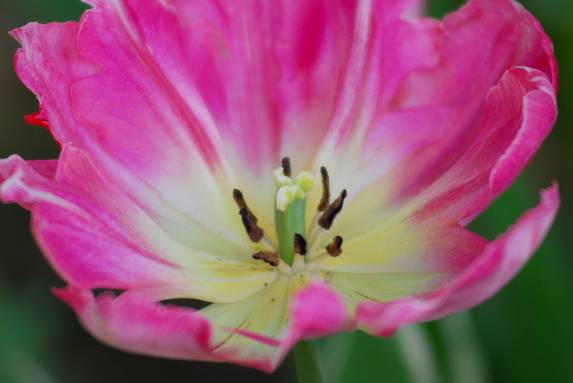
SP: What we consider normal, like mall walkers, you consider “goofy,” and things that you might have considered normal when you lived in France…
Gasquet: I’m now finding that goofy. Like, I make fun of those kids in France who are trying to be cool by dressing like American artists here. But at the time that I lived there, I found that interesting, but now I find it goofy because it doesn’t make sense anymore. It’s ridiculous.
And when I see people here trying to be like a French artist, I find it cute. It’s cool; it’s totally different. It’s an angle of the point of view from what you can see, what’s different. Noticing what’s different.
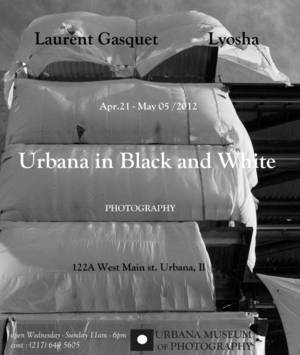 ~~*~~
~~*~~
Selections of Laurent Gasquet’s photography can be found on his website. He will be exhibiting his photography at Sun Singer Wine and Spirits during the Boneyard Festival on April 19–20.
On April 21, Gasquet and Lyosha Svinarski will open Urbana Museum of Photography (112A West Main in Urbana), their new gallery devoted to showcasing historical, black-and-white photographs of Urbana, Illinois.








